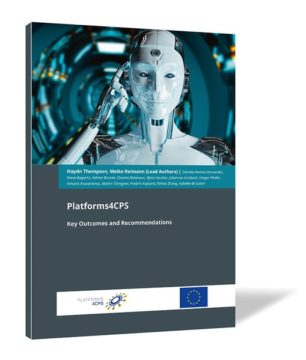The Platforms4CPS booklet was developed within the framework of the European project Platforms4CPS funded by the H2020 Research and Innovation Programme of the European Commission. Platforms4CPS is a collaboration between seven partners from four European countries Thales, France, Steinbeis 2i GmbH, Germany, THHINK Wireless Technologies, UK, FESTO AG & Co KG, Germany, FORTISS GmbH, Germany, KTH Royal Institute of Sweden and Systematic Paris Region Association, France.
The booklet presents the key outcomes of the work identifying business opportunities for European companies, the Platforms4CPS Repository and PlatForum, a CPS community roadmap, a Technology and Research Radar, innovation strategies for Europe, as well as work on developing a consensus on societal and legal issues addressing connectivity considering privacy, confidentiality and cybersecurity for CPS/IoT, legal issues considering risk and liability for autonomous vehicles, service Level agreements for new services, e.g. mobility providers and medical monitoring, ethical issues of AI and social impact of automation and robotics. The aim is to provide assistance to the European Commission in structuring the future Horizon Europe Research Programme, as well as giving researchers in the field and decision-makers from industry, academia, and policy making a broad perspective on developments and implementations in the field of Cyber-Physical Systems.
Die Platforms4CPS-Broschüre wurde im Rahmen des H2020 Forschungs- und Innovationsprogramms der Europäischen Kommission entwickelt. Platforms4CPS ist eine Kooperation zwischen sieben Partnern aus vier europäischen Ländern: Thales, Frankreich; Steinbeis 2i GmbH, Deutschland; THHINK Wireless Technologies, Großbritannien; FESTO AG & Co KG, Deutschland; FORTISS GmbH, Deutschland; KTH Royal Institute of Sweden; Systematic Paris Region Association, Frankreich.
Die Broschüre stellt die wichtigsten Ergebnisse der zweijährigen Projektarbeit dar, wie die Identifizierung von Geschäftsmöglichkeiten für europäische Unternehmen, das Platforms4CPS Repository, das PlatForum, eine CPS-Community-Roadmap, ein Technologie- und Forschungsradar als auch Innovationsstrategien für Europa. Darüber hinaus wird im Rahmen der Broschüre unter anderem die Entwicklung eines Konsenses über gesellschaftliche und rechtliche Fragen in Bezug zur Konnektivität unter Berücksichtigung von Datenschutz, Vertraulichkeit und Cybersicherheit für CPS / IoT beschrieben. Ziel ist die Unterstützung der Europäischen Kommission bei der Strukturierung des künftigen Forschungsprogramms Horizon Europe sowie Forschern und Entscheidungsträgern aus Industrie, Wissenschaft und Politik aktuelle Entwicklungen im Bereich der cyber-physikalischen Systeme aufzuzeigen.
This booklet was developed within the framework of the European project Platforms4CPS funded by the H2020 Research and Innovation Programme. Platforms4CPS is a collaboration between seven partners from four European countries: Thales, France, Steinbeis 2i GmbH, Germany, THHINK Wireless Technologies, UK, FESTO AG & Co KG, Germany, fortiss GmbH, Germany, KTH Royal Institute of Technology, Sweden, and Systematic Paris Region Association, France. The booklet presents the key outcomes of the work identifying business opportunities for European companies, the Platforms4CPS Repository and PlatForum, a CPS community roadmap, a Technology and Research Radar, innovation strategies for Europe. In addition, the project developing a consensus on societal and legal issues addressing connectivity, privacy, confidentiality and cybersecurity for CPS/IoT, legal issues considering risk and liability for autonomous vehicles, Service Level Agreements for new services, e.g. mobility providers and medical monitoring, ethical issues of AI, and social impact of automation and robotics.
The CPS community foresees great potential in creating a competitive edge for Europe, serving existing and new markets. However, in order to be successful there is a need to ensure that the right technology areas are supported and that there is a transfer of new ideas to European companies via appropriate innovation mechanisms. At the same time societal concerns need to be addressed. Europe needs to master a number of emerging themes such as “autonomous systems”, “Artificial Intelligence” as well as providing “trustable systems for European Citizens” via best design practice, appropriate regulation and through ensuring sovereignty in key value chains.
The booklet identifies grand challenges, recommendations and actions required in terms of research priorities, supporting innovation needs, societal and legal issues that need addressing, and strategic business support. The aim is to provide assistance to the European Commission in structuring the future Horizon Europe Research Programme, as well as giving researchers in the field and decision-makers from industry, academia, and policy making a broad perspective on developments and implementations in the field of Cyber-Physical Systems.
- Veröffentlicht am Montag 15. Oktober 2018 von Steinbeis-Edition
- ISBN: 9783956631832
- 56 Seiten
- Genre: Natur, Naturwissenschaft, Sachbücher, Technik
